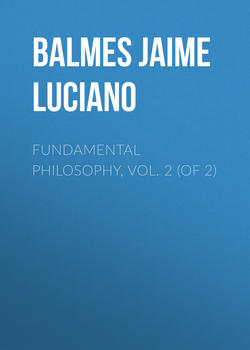Читать книгу Fundamental Philosophy, Vol. 2 (of 2) - Balmes Jaime Luciano - Страница 18
BOOK FOURTH.
ON IDEAS
CHAPTER XVIII.
ASPIRATIONS OF THE HUMAN SOUL
Оглавление111. A close observation of internal phenomena shows that the human soul aspires to something far beyond all that it actually possesses. Not satisfied with the objects given to it in immediate intuition, it darts forward in pursuit of others of a superior order; and even in those that are offered to it immediately, it is not contented with the aspect under which they appear, but seeks to know what they are. The purely individual does not satisfy the soul. Nailed to one point in the immense scale of beings, it is unwilling to limit itself to the perception of those that are in its environs, and form, as it were, the atmosphere wherein it must live; it aspires to the cognition of those that precede and follow it, and seeks to know the connection, to discover the law from which results the ineffable harmony that presides over the creation. It finds its purest pleasures in rising from the sphere where the limitation of its faculties holds it confined. Its activity is greater than its strength; its desires superior to its being.
112. We discover the same phenomenon in the sentiment and the will as in the understanding. Man has, to satisfy his necessities, and provide for the preservation of the individual and of the race, sensations and sentiments which direct him to determinate objects; but at the side of these affections, limited to the sphere in which he is circumscribed, he experiences sentiments of a more elevated character, which make him spring beyond his orbit, and absorb, so to speak, his individuality in the ocean of infinity.
When man comes in contact with nature in herself, despoiled of all conditions relating to individuals, he experiences an indefinable sentiment, a kind of foretaste of the infinite. Go into an uninhabited region and sit down by the sea side; hark to the deafening roar of the waves breaking at your feet, and the whistling of the winds which have raised them; with eyes fixed on this immensity, see the azure line where the vault of heaven unites with the waters of the ocean: stand on a vast and desert plain, or in the heart of ancient forests; contemplate in the silence of night the firmament studded with stars, following their course in tranquillity, as they have followed it for ages past, and will follow it for ages to come: without effort, or labor of any kind, abandon yourself to the spontaneous movements of your soul, and you will see how sentiments spring up in it and move it to its very centre; how they elevate it above itself, and absorb it, as it were, in immensity. Its individuality vanishes from its own eyes, as it feels the harmony presiding over that immense creation of which it forms but a most insignificant part. In such solemn moments is it that inspired genius chants the glories of creation, and lifts one corner of the veil that hides the resplendent throne of the supreme Creator from the eye of mortals.
113. That calm, grave, and profound sentiment which masters us on such occasions, has no relation to individual objects; it is an expansion of the soul at a touch of nature, as the flower expands to the rays of the sun in the morning, it is a divine attraction by which the author of all created things raises us above the dust in which we drag out our brief days. Thus the heart and the understanding harmonize; thus the one foretastes what the other knows; thus we are warned in different ways, that the exercise of our faculties is not limited to the narrow orbit conceded to us upon this earth. Let us be on our guard, lest the heart be frozen with the coldness of insensibility, and the torch of the understanding quenched by the devastating blasts of skepticism.
